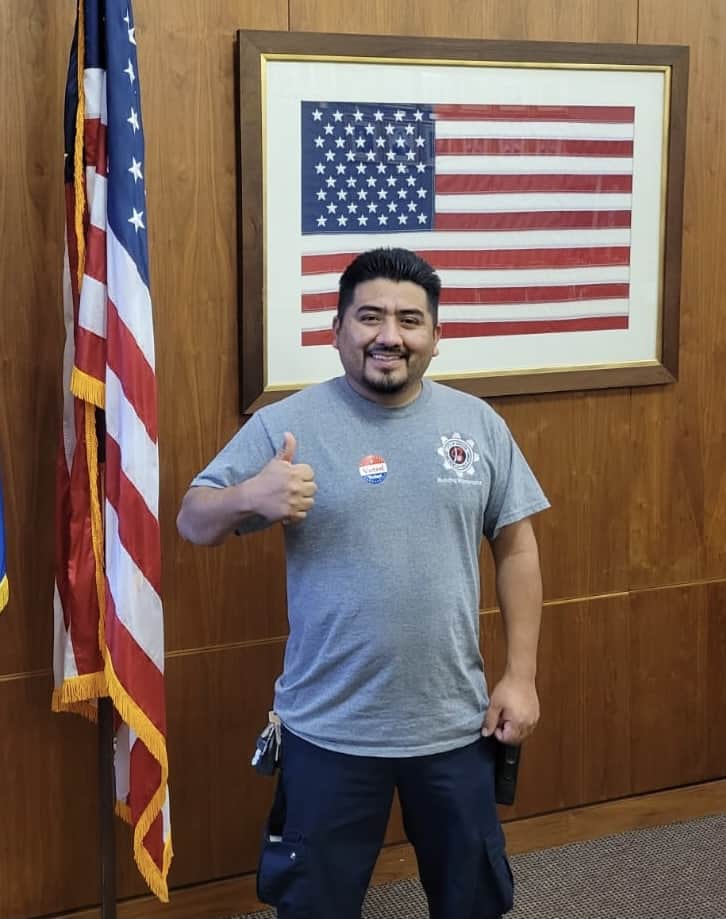Publisher’s Note: Please participate in a short survey at the end of the story. Knowing how this story may have influenced you can help guide our future reporting...Thank you!
“People feel excluded in not having the knowledge because of the language barrier,” said Luis Lorenzo, a resident of Bristol, about what he thinks keeps new Americans like himself from participating in the electoral process. Lorenzo is originally from Mexico.
Lorenzo was featured in Voting System Fails Immigrants, as part of the Advancing Democracy: Connecticut Solutions Journalism Initiative that CTLatinoNews.com (CTLN) is undertaking as part of eight reporting projects in 10 newsrooms across the United States. The six-month program is sponsored by the Solutions Journalism Network (SJN); its mission is to spread the practice of solutions journalism: rigorous reporting on responses to social problems.
CTLN is exploring solutions to why Hispanics-Latinos don’t vote by engaging with thought leaders in Connecticut and drawing from the best practices and lessons learned in communities across the country.

WATCH the Interview.
“Inability to speak or read English cannot be a barrier to the most cherished right of a U.S. citizen, the right to vote,” said Arturo Vargas, the executive director of the National Association of Latino Elected and Appointed Officials Educational Fund, in an interview with NBC. Vargas cited the example of Puerto Ricans, the majority of Hispanics-Latinos in Connecticut, who are not required to read or write English if they live in Puerto Rico.
A Puerto Rican who moves to the U.S. mainland and is not proficient in English “is a fully franchised U.S. citizen and must have free and complete access to the ballot,” said Vargas, regardless of language proficiency.
As a way to make voting more accessible, the U.S. Census Bureau notified 10 Connecticut towns and cities last December that they had to provide language assistance for eligible Hispanic-Latino voters whose English skills were deemed inadequate to participate in the electoral process.
This federal mandate emanated from Section 203 of the 1975 revision of the Voting Rights Act of 1965 and is based on American Community Survey figures. The criteria are a minority language group comprising at least 5 percent or 10,000 members of the eligible voter population.
For 2021, the Census Bureau designated 331 jurisdictions across the United States that must provide bilingual voting assistance compared to 263 in 2016. This list ranges from entire states, such as Florida and California, with large Hispanic and Asian populations, to central Alaskan villages where Yup’ik is a prevalent language.
Ricardo Negron-Almodovar, All Voting is Local’s Florida campaign manager says new language accessibility determinations under Section 203 are hindered by U.S. laws that do not fully remove language barriers in elections. “These disparities in language provisions ultimately have a discriminatory effect on our multiracial democracy, leaving out entire swaths of people,” Negron-Almodovar said. He believes over a million Floridians find themselves at a disadvantage when voting because English isn’t their primary language.
In many cases, compliance has been an ongoing process spanning more than one five-year consent periods. In Connecticut, the Section 203 towns include nine designated in 2016: Bridgeport, East Hartford. Hartford, Meriden, New Britain, New Haven, New London, Waterbury, and Windham. Norwalk was added this time.
Section 203 serves as a double-edged tool in removing the language speed bump inhibiting and complicating Hispanic-Latino voter turnout.
Whether Section 203 compliance can positively increase the number of Hispanics-Latinos going to the polls, Teresa Begnal, Waterbury’s Democratic Register, says “absolutely.” And without these structures, she said, “there would definitely be more confusion.
A primary reason that Congress included minority language provisions in the Voting Rights Act was an awareness that many members of these groups had been effectively excluded from participation in the election process.
U.S. Rep. John Larson, whose constituency includes Hartford and East Hartford, sees the provision’s call to action as integral to the current debate about voting rights. He noted these mandates are strengthened in the John R. Lewis Voting Act, which is currently stalled in the Senate.
“We must do everything we can to make voting as accessible as possible,” Larson said. He also suggests that if anyone has any concerns, they should report them to their local election board and the Secretary of the State.
“There are many Hispanic immigrants, including those who are U.S. citizens, who aren’t necessarily comfortable in their English speaking abilities,” said Mark Hugo Lopez, Director of Hispanic Research at the Pew Research Center, in a recent interview with CTLN. “Spanish (information) might help those folks.”
More than 23 million U.S. immigrants were eligible to vote in the 2020 presidential election, making up roughly 10 percent of the nation’s overall electorate – both record highs, according to Pew Research Center estimates based on Census Bureau data.
Fifteen percent of Connecticut residents are born in another country, according to the American Immigration Council.

The Census Bureau uses the American Community Survey to determine every five years who is covered rather than every ten years as was the standard in the past. Compliance is required if more than five percent or more than 10,000 voting-age citizens are limited-English proficient.
In Connecticut, the affected jurisdictions include the state’s eight largest cities, the home of many eligible HispanicLatino voters whose English skills are insufficient reside. Citizens whose primary language is Spanish comprise the population requiring assistance in all ten of the affected jurisdictions. However, five years ago, a Native American cluster in Kent was covered.
Nearby Massachusetts had the most communities added to the list, increasing from 12 to 19.
Spanish also is the language of most of the citizens of the three states and many of the 300 towns and counties requiring compliance. Still, Section 203 also applies to Asians, American Indians, and Alaska Native voting-age citizens.
The five percent criteria can represent a low hurdle in cities such as Hartford and Bridgeport. In the latter, one-third of the households are categorized as having Spanish as the primary language.
The U.S. Department of Justice monitors elections as needed to determine whether programs required under the Voting Rights Act are being implemented, although ultimately, local election officials ensure their jurisdiction complies.
Solutions to language barriers preventing eligible voters from the polls must take a proactive and not reactive or passive approach. It is common for election officials to say that language assistance is not required because no one asks for it. But they cannot make such assumptions. It is their responsibility, not the voters, to investigate the public’s need and ensure that effective language help is provided.
In Dallas, where nearly 21,000 citizens of voting age speak Vietnamese, some 400 locations will be outfitted with cell phones that voters can use to access translators in the March primary.
Philadelphia, where more than 24 percent of the city’s citizens are speakers of a non-English language, Spanish being the most common – use voting machines, touted for their ability to accommodate at least 12 languages.
Grassroots organizations like Mijente lead crucial campaigns targeting voters in Spanish language in Georgia, where the number of Hispanic-Latino registered voters grew by more than 57 percent (2016 to 2020), but Spanish ballots are not widely available.
The Connecticut Office of the Secretary of State in meeting federal law requirements will supply the translated materials to the Section 203 towns. Language assistance includes the bilingual signs posted at a polling place, said Begnal. What a town is required to do can be extensive. For example, New Britain plans to do the following activities according to Rachel Zaniewski, public affairs specialist, Office of Mayor Erin E. Stewart:
1. Individuals choosing to register to vote can register using a registration form in Spanish
2. Voters choosing to vote can cast a ballot that is bilingual.
3. All election materials are printed in both Spanish and English. That includes not only the ballot but instructional posters that not only instruct voters on how to vote but also speak to their rights.
4. All legal notices of elections and polling locations are in English and Spanish.
5. Spanish-speaking poll workers and moderators are hired to help with elections.
In Waterbury, all letters and other written materials are in English and Spanish, and there is someone bilingual at each polling local, Begnal said. She has reached out to the local Spanish Coalition for help at the polls. Or, on occasion at the office, the English-speaking official has gone across the hall to a Spanish program for a translator.
CT Latino News (CTLN) is planning to collaborate with partner Connecticut State Library in hosting events and providing not only Spanish language information to prospective voters, but messaging and assistance that is culturally relevant. “Sometimes people can’t write or they can’t read, and I tell them that as long as I’m here, I can help to interpret,” said Graciela Rivera, Branch Manager for the Hartford Public Library.
Whether or not assistance in Spanish language will increase the number of Hispanic-Latino voters at the polls at this year’s midterm election and in the 2024 presidential election is yet to be seen, but new voters like Lorenzo are optimistic.
“Now, with me becoming a citizen, it gave me the opportunity to contribute, to have a voice – not only for me but other people,” said Lorenzo.
Cover Photo by Nitish Meena on Unsplash

Removing Language Barriers In Voting is supported by a grant from the Solutions Journalism Network (SJN).




